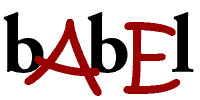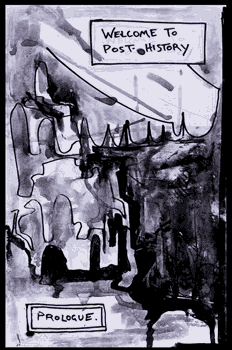BAbEl
Contents
Prologue
[You hear the following spoken aloud by a man standing on a stage in the town center, wearing a worn tan coat and a blank white mask]
Welcome to Post-History.
In mid-September of 2251, books began to burn themselves. More specifically, post-historians have determined that any inscription or encoding bearing semantic content that was created after August 21st burst into flames, over the course of a few short hours. All attempts to write, type, or otherwise inscribe anew met the same fate: a sudden increase in temperature and swift conflagration. This happened, and still happens, regardless of the attempted medium.
Needless to say, the consequences were dramatic.
Today's society was born from the coals of the resultant month-long Burning of the world. None would would call our rebirth triumphant, and only the most blindly dogmatic amongst us are foolish enough to compare our fate to the phoenix.
[The majority of the crowd that has formed laughs and whistles at this last comment.]
Some say we have seen the resetting of a cycle, an inexorable descent into obscurity, and that we will be able to make record of our words again someday.
If this is true, I hope that we do better next time. I hope that we do not forget the power of words. Of course, there is no guarantee we will make it that long, since, as you know well, I have yet to mention the demons.
The World of bAbEl
The setting of this game is a post-apocalyptic world, but a peculiar one. The fires of the Burning did much damage, and killed many, but substantial areas were relatively untouched (inner forests where fires didn't reach, areas that contained a high density of non-flammable material, such as downtown city blocks). Most significant is that words have power. Old writings can still be read, but they burn if read aloud, just as new words burn immediately upon being written. And there is magic to be found in those fires.
Scholars seek to preserve the old knowledge and harness the magical powers of the written word, risking the chance that they will call Demons their way.
Chanters are resurrecting the old oral traditions and keep memories in the spoken word - holding communities together through stories.
Rhymers try to beat the demons at their own game, using the strength of rhyme to preserve truth.
Namers seek the True Names of things, now that such things are no longer static, but must be captured.
Most everyone else just tries to get by.
What about Art? Symbols? Numbers?
Art and other drawings, even most maps, do not burn. Most Scholars believe that this is because the meanings of such things are too indeterminate - too subjective. (Others argue that this is just evidence that Art in fact has, and never had, any meaning at all.) The majority of things that represent loosely in this manner are just fine, including most simple symbols. This has led to a lot of debate, because many camps argue that words only represent loosely. Some well-known and cemented symbols do burn though. The best examples are some corporate logos. The story of the stubborn McDonald's owner who tried to open up a store after the burning and erect a golden arch outside is not apocryphal.
Pictographs are tricky, because they walk a line between pure pictoral representations and language-like semantic structures. As a general rule, the more language-like they are, the more likely they will burn. Japanese Kanji burn at the radical level (the components of Kanji - which have meaning themselves - burn before you even finish the character). Cave painting type stuff doesn't. The line seems to be fuzzy, but it's easy to tell when you've crossed it (Burn!).
Numbers - unlike Art, Symbols, and Pictographs - are not tricky. They burn, hot and bright. This makes commerce a bitch.
Magic
When words are written, and burn, they release power. One can train oneself to harness this power to do magical things, ranging from the simple to the spectacular. I haven't yet decided what sort of magical stuff can be done, or what correlation it has to the word(s) written/read, although I know that the longer the work and the more complicated/profound it is, the more power you get. Reading an old text message gets you a little bit of power ('roflcopter!'). Good Night Moon gets you a reasonable power boost. Reading Shakespeare gets awesome.
I am definitely open to suggestions as to what form Magic should take in this world. We have burning words as the catalyst. What comes next?
Continuity note: Holy texts is the obvious question. I can imagine a story arc where religious zealots read out loud over and over the holy books of their theological opposites. If they don't pronounce things exactly right, then do the texts still burn? The irony would be that in order to effectively incinerate them they would have to be familiar enough with the ideas to be changed by them, to say nothing of the magical side-effects. Does every liturgy burn an incunabula of mass, for example? Similarly, what if you memorize a book and then read it over a loudspeaker, or on the radio (do radio waves count as data, do they burn in invisible frequencies across the sky as they are broadcast?)The exact mechanics would be fun to figure out. Is it always the nearest copy of a spoken text that bursts into flames? Since almost all sentences spoken in conversational English are written in books, does this mean that every conversation is eating, worm-like, through an ultimately finite library? What about tattoos?
Good Night Moon?
Demons?
Yes. Demons.
I know that in some ways it feels like the Demons are thrown in, and (as I said in response to Ben) I've toyed with whether or not I need them at all. But, I think that they serve at least three purposes. One, they provide an important disincentive for writing/reading aloud without good cause. Two, they provide a possible back story for the Burning. Three, they serve as powerful antagonists for player characters. I address these in turn:
(1) As I'm currently conceiving of it, Demons are drawn to sources of power, gobbling it up to make themselves into bigger and badder demons. Using words releasing power, hence Demons are drawn to those who use words. I consider this to probably be more of a boogeyman tale than a normal occurrence. Writing a word to start a fire to make dinner won't call a Demon (unless one is really nearby), but it might get your village pissed at you for risking it. This allows Demons to be shadowy character who are rarely seen but have a looming presence on the world as a whole. (An alternate possibility is that writing doesn't really call Demons, but people superstitiously think that it does.)
ALTERNATE OPTION: #1 could probably be taken care of if the power released by Burning was volatile and could easily harm the person who attempted to harness it, as magic often can in game worlds. This is the option to go with if it seems that the Demon thing is unnecessary.
(2) The Burning released a WHOLE lot of power. After that is when people started reporting run-ins with Demons. Demons stood to benefit from the Burning. Coincidence?
(3) While merely existing in the world of bAbEl could create all sorts of possible scenarios, having Demons exist creates the possibility for some deeper hooks, really big bad guy run ins, and some possibility of "getting to the bottom of things" mixed with "maybe we can change things back!" action.
Regardless, most of the Demon stuff would be rather behind the scenes, with the player characters knowing very little about them or their connection to words, etc. I consider this a defeasible, but I think compelling, framing device.
Oh yeah, and Demons have True Names. And Names are important (in general). And finding out a Demon's True Name lets you kill it (or at least really fuck it up). This is mostly because I have always liked this device, even if it is overused, and I think that it fits very well in this setting.

